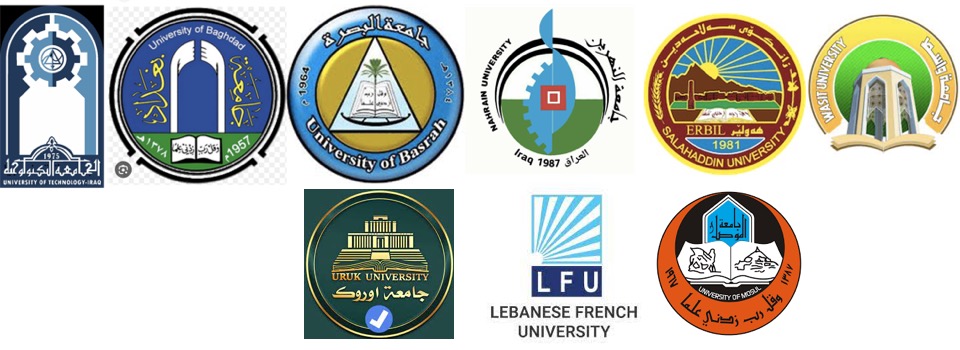Advanced Technology, AI, and Historic Preservation
This special session is organised and supported by the University of Technology in collaboration of the following educational partner:
Session Chairs:
- Dr. Venus Suleiman Akef , The University of Technology, Iraq
- Dr. Sabeeh Lafta Farhan, Wasit University, Iraq
Session Co-Chair:
Dr. Salahaddin Yasin Baper, Salahaddin University-Erbil, Kurdistan region, Iraq.
Session Committee:
- Dr. Hamed H. Samir, University of Basrah, Iraq
- Dr. Shatha Abbas Hasan, University of Baghdad, Iraq
- Dr. Mohammed Qasim Abdul Ghafoor, Al-Nahrain University, Iraq
- Dr. Rawaa Putros Qasha, University of Mosul, Iraq
- Dr. Mufeed Ehsan Shok, The University of Technology, Iraq
- Dr. Banar Fareed Ibrahim, The Lebanese FrenchUniversity (LFU)-Erbil, Kurdistan Regin, Iraq
- Dr. Ibtisam Abdulelah Moahmmed Al Khafaji, Al-Esraa University College, Iraq
- Dr. Mohammed Al-Hasani, URUK University, Baghdad, Iraq
- Mr. Oday Hammody Abdullah, The University of Technology, Iraq
Synopsis:
In this special session, historic preservation is included as a completely new chapter within the discourse of the development in electronic systems and engineering (AI, Robotics, Sensors, and Industry).
Historic preservation is about protecting and enhancing tangible and intangible legacies of the past (such as buildings, landscapes, traditions, and all kinds of objects and artifacts of historical and cultural significance). The core concept of historic preservation is never only about the past, it is about enhancing the present and creating sustainable platforms for the future generations through positive conversation with the past. By the 20th century the concept of historic preservation has become more popular; special laws and guidelines have been developed to regulate the practice and actions. In its 2030 Agenda for sustainable development, the United Nations has considered historic preservation as an active strategy for sustainable development. However, by the 21st century, as we are living the age of the advanced modern technology and artificial intelligence, it becomes crucial to discover the future of historic preservation and how the rapidly developing technology would impact the whole discourse of historic preservation. Hence, the question of what role the advanced technology and AI would play in enhancing the concept and the practice of historic preservation becomes inevitable.
Topics:
-
Technology, AI, and the future of historic preservation: a strategy for sustainable development
-
Advanced technology and digital documentation for historic preservation, conflict resolution and peacebuilding in postwar contexts.
-
Livability and sustainable heritage value
-
The future vision on historic preservation in light of the developing technology and artificial intelligence.
-
Analyzing the national and international cases studies on Technology, AI, and historic preservation: Addressing the existing experience.
-
Geomatics, Cybernetic, &Cyborg, Augmented &Virtual Reality.
-
HBIM Historic Building Information, Big Data, and Digital Twins.
-
Photogrammetry and digital documentation of heritage.
-
Sustainable historical sites through spatial technology.
Paper Submission:
Prospective authors are invited to submit full-length papers (not exceeding 6 pages) conform to the IEEE format . All papers will be handled and processed electronically via the EDAS online submission system.


